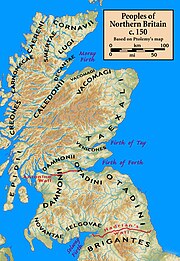
Back Каледони Bulgarian Caledonii Breton Caledons Catalan Caledoniaid Welsh Kaledonier German Caledonios (Escocia) Spanish Calédoniens French Caladónaigh Irish Kaledónok Hungarian Caledonii ID
This article includes a list of general references, but it lacks sufficient corresponding inline citations. (July 2010) |

The Caledonians (/ˌkælɪˈdoʊniənz/; Latin: Caledones or Caledonii; Ancient Greek: Καληδῶνες, Kalēdōnes) or the Caledonian Confederacy were a Brittonic-speaking (Celtic) tribal confederacy in what is now Scotland during the Iron Age and Roman eras. The Greek form of the tribal name gave rise to the name Caledonia for their territory. The Caledonians were considered to be a group of Britons,[1] but later, after the Roman conquest of the southern half of Britain, the northern inhabitants were distinguished as Picts, thought to be a related people who would have also spoken a Brittonic language. The Caledonian Britons were thus enemies of the Roman Empire, which was the state then administering most of Great Britain as the Roman province of Britannia.
The Caledonians, like many Celtic tribes in Britain, were hillfort builders and farmers who defeated and were defeated by the Romans on several occasions. The Romans never fully occupied Caledonia, though several attempts were made. Nearly all of the information available about the Caledonians is based on predominantly Roman sources, which may be biased.
Peter Salway assumes that the Caledonians would have been Pictish tribes speaking a language closely related to Common Brittonic, or a branch of it[2] augmented by fugitive Brythonic resistance fighters fleeing from Roman-occupied Britannia. The Caledonian tribe, after which the historical Caledonian Confederacy is named, may have been joined in conflict with Rome by tribes in northern central Scotland by this time, such as the Vacomagi, Taexali and Venicones recorded by Ptolemy. The Romans reached an accommodation with Brythonic tribes such as the Votadini as effective buffer states.
- ^ Encyclopaedia Romana. University of Chicago. accessed March 1, 2007
- ^ Watson 1926; Jackson 1955; Koch 1983; Smyth 1984; Forsyth 1997; Price 2000; Forsyth 2006; Woolf 2007; Fraser 2009